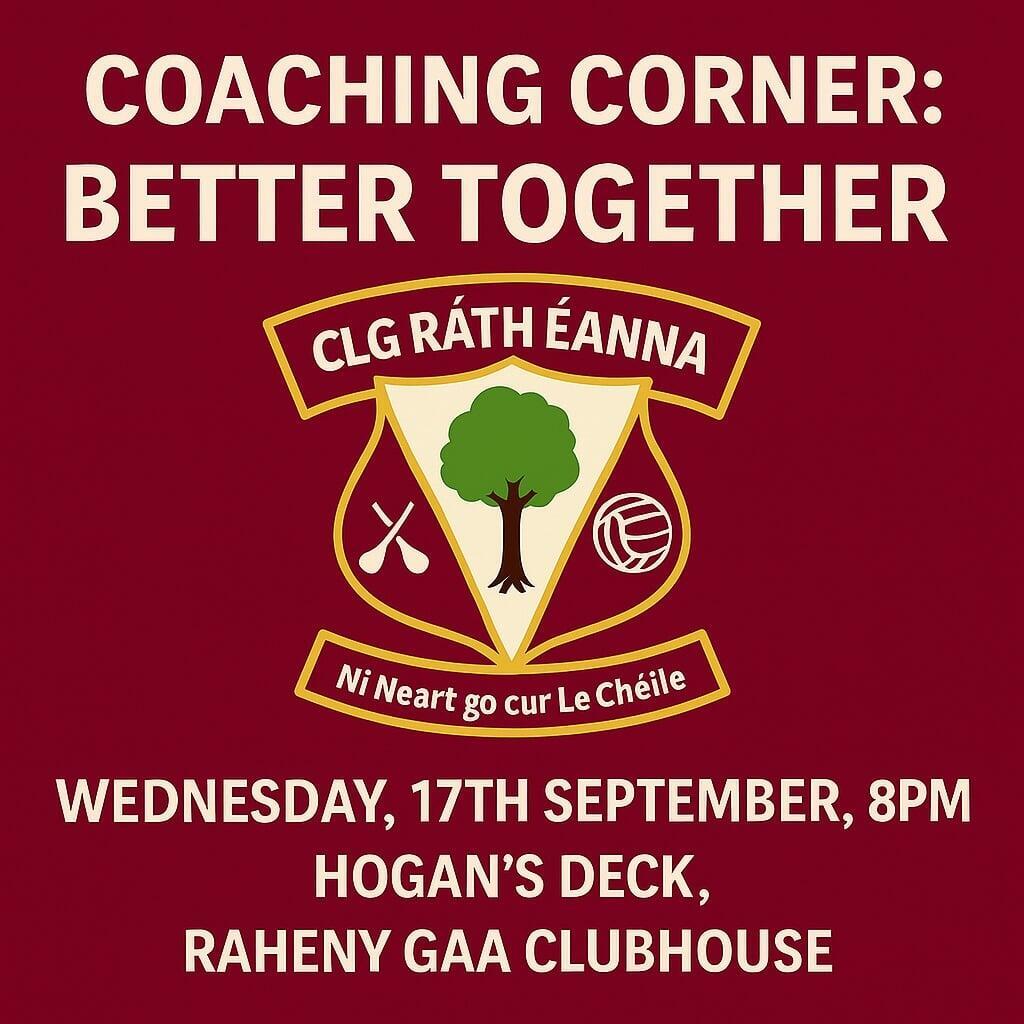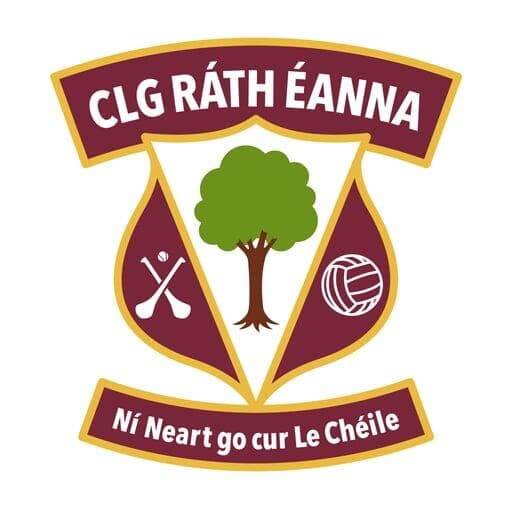Better Together

Coaching Corner: Better Together — Raising Our Coaching Game to Build Better Players, Year to Year
Meeting details: Wednesday, 17th September, 8pm, Hogan’s Deck, Raheny GAA Clubhouse.
Looking ahead to our meeting we’ll gather in Hogan’s Deck, Raheny GAA Clubhouse for our next Coaches & Mentors meeting. While there’s a full agenda to get through, one topic we’d like you to start thinking about now is how we can add real value to coach education in our club over the next few years. The truth is that great coaching doesn’t just happen on the pitch — it’s built on shared ideas, clear roles, and strong communication. If we want to keep raising our standards, we need to tackle some recurring challenges head-on.
This is not about pointing fingers — it’s about recognising where we can improve and committing to doing it together. On the 17th, we’ll start to explore practical ways to address these issues, share success stories, and set some clear actions for the season ahead. Your voice matters. Whether you’re a seasoned coach or just starting out, your perspective can help shape the future of coaching in our club.
Some examples of topics for our meeting:
1. Lack of idea sharing among club coaches: - Too often, club coaches work in silos. Imagine the impact if we regularly swapped drills, session plans, and problem-solving tips. A culture of open exchange can lift everyone’s game.
- Why it matters: When we keep drills and session wins to ourselves, we force others to reinvent the wheel — players miss out on proven methods.
- What good looks like: U12 tackling drill shared with U16s; senior match-day prep routines passed down; a living bank of session plans anyone can lift and use.
- Try this: Bring one drill, one constraint game, and one recovery idea you rate. Be ready to explain at our meeting when you use them and why.
2.*Ad hoc approach to coaching roles* - An ad hoc approach to who does what can lead to confusion for players and frustration for coaches. Defining roles clearly — and sticking to them — helps everyone focus on what they do best.
- Why it matters: Sometimes we fall into “whoever’s free will do it” mode. This can lead to mixed messages for players and frustration for coaches.
- What good looks like: Clear roles set before training — who leads warm-ups, who coaches the main theme, who observes, who gives post-session feedback.
- Try this: Write down your current role on your team. Note one area you’d happily own weekly (e.g., skill block, S&C warm-ups, video clips).
3. Incessant instruction and commentary - Incessant instruction can overwhelm players. Sometimes the best coaching is knowing when to step back and let them figure it out. Silence can be a powerful teacher.
- Why it matters: Constant talk kills player decision-making and confidence. Silence, at the right time, creates learners.
- What good looks like: Short cues, clear task, let them play; coach during pauses, not play; questions over commentary.
- Try this: Pick one game where you’ll coach with a timer — For example, 90 seconds talk time, 3-4 minutes play. Track what changes.
4. Meaningful age-to-age communication - From U8 to senior, we need meaningful conversations between coaches at every level. This ensures players progress through the club with consistent messages and skills.
- Why it matters: Players move up a year, and their new coaches start blind. Good habits get lost; old challenges reappear.
- What good looks like: A simple handover note on each player from one mentor to another: strengths, two growth points, position exposure, attendance notes — a two-minute voice note or one-page profile.
5. Poor coach to player ratios - Too few coaches for too many players means less individual attention and slower development. We need to think creatively about recruitment, retention, and volunteer support.
- Why it matters: One coach to 25 players means missed reps and no individual feedback.
- What good looks like: Smarter station design, training session plans for setup and rotations, asking for older players to mentor younger groups.
- Try this: Identify one adult player you can invite as a session helper in the next month. Plan stations so every mentor has a clear job at training.
6. Continued absence of individual player coaching - Team sessions are vital, but so is one-to-one feedback. Even a quick personal word can make a huge difference to a player’s confidence and growth.
- Why it matters: Team sessions build systems; one-to-ones build people. Players stay when they feel seen.
- What good looks like: A 30-second personal cue, a micro-goal for the week, a quick “what did you notice?” after a rep.
- Try this: Pick two players. Prepare one specific cue for each (e.g., “plant foot outside cone,” “eyes up before solo”).
What ties it all together:
- Player-first progress: Consistency from U8 to adult so messages compound rather than reset.
- Shared standards: We agree how we coach — and hold each other to it with care.
- Small changes, big wins: None of this need’s new facilities — just better habits and shared ownership.
Your prep for the meeting:
- Bring: One idea, one challenge, one success story.
- Review: The six challenges above; think about one practical fix for each that you can trial within two weeks.
- Commit: Choose one role you’ll own this season and one coach you’ll support.
Call to action:
- Be there: Wednesday, 17th September, Hogan’s Deck, 8pm sharp — your voice shapes how our club coaches.
- Own a fix: Pick one of the six challenges and think of a concrete action you’ll start this month.*
- Share to raise: Bring a drill, a game, and a feedback habit you’ll gift to the room.
Our players deserve the best. Let’s give it to them — together. See you next Wednesday night
Thanks,
Brian
Coaching Officer


